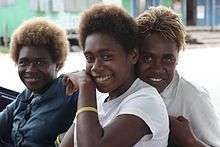Papuan people
|
Children dressed up for sing-sing in Yengisa, Papua New Guinea. | |
| Regions with significant populations | |
|---|---|
| New Guinea (Papua New Guinea and West Papua (region), Indonesia), East Timor | |
| Languages | |
| Trans–New Guinea languages, Papuan languages | |
| Religion | |
| Protestantism, Roman Catholicism, Animism, Islam | |
| Related ethnic groups | |
| Melanesians, Moluccans, Indigenous Australians |
Papuan is an umbrella term for the various indigenous peoples of New Guinea and neighbouring islands, speakers of the Papuan languages. They are often distinguished ethnically and linguistically from Austronesians, speakers of a language family introduced into New Guinea about three thousand years ago.
Genetics
In a 2005 study of ASPM gene variants, Mekel-Bobrov et al. found that the Papuan people have among the highest rate of the newly evolved ASPM haplogroup D, at 59.4% occurrence of the approximately 6,000-year-old allele.[1] While it is not yet known exactly what selective advantage is provided by this gene variant, the haplogroup D allele is thought to be positively selected in populations and to confer some substantial advantage that has caused its frequency to rapidly increase.
Papuan ethnic groups


Indonesia territory
Papua New Guinea territory
Notable people
- Frans Kaisiepo, the 4th Governor of Papua and a National Hero of Indonesia.
- Freddy Numberi, politician and former Indonesian minister.
- Heather Watson, an English female tennis player.
- Michael Somare, former Prime Minister of Papua New Guinea.
- Oktovianus Maniani, an Indonesian professional footballer.
- Peter O'Neill, the 9th Prime Minister of Papua New Guinea.
- Nitya Krishinda Maheswari, an Indonesian badminton player and 2014 Asian Games women's doubles gold medalist.
- Raema Lisa Rumbewas, an Indonesian weightlifter and silver medalist at 2000 Summer Olympics and 2004 Summer Olympics.
- Abba Bina, a notable businessman.
See also
References
- ↑ "Ongoing Adaptive Evolution of ASPM, a Brain Size Determinant in Homo sapiens", Science, 9 September 2005: Vol. 309. no. 5741, pp. 1720–1722.
Further reading
- W. G. Lawes (1882), New Guinea And Its People, Popular Science Monthly
| Wikimedia Commons has media related to People of Papua New Guinea. |

